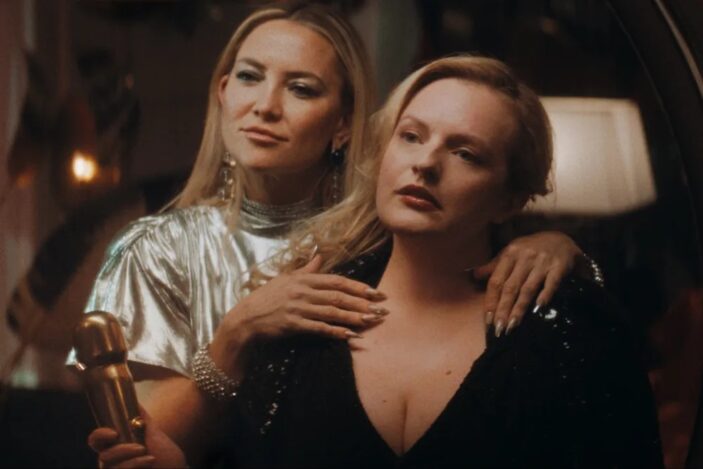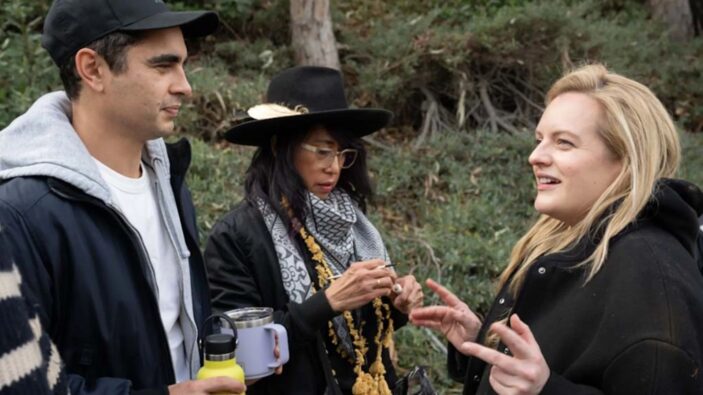
If you could restore youthful beauty and guarantee longevity by committing to a few days of mysterious treatments, would you? Would you trust your life and health to science and technology that might be more hype than healthy? Enter Shell.
Samantha (Elisabeth Moss) is thinking it over. She’s a slightly unkempt, earnest, talented actress who can’t seem to nail the jobs she wants, and both her confidence and bank account are shrinking. She also looks slightly older than her competition, so at the prompting of her agent and the numerous neon billboards touting its miraculous outcomes, Samantha commits to a treatment from Shell. It’s a success and the result is a glowing, more invigorated Samantha with a new lease on life.
Enter Zoe Shannon (Kate Hudson) the glamorous CEO of Shell, the living embodiment of her products. Zoe offers to take Samantha on as a protégé and soon the actress’s star starts to rise. But Samantha also starts to get suspicious about missing friend Chloe (Kaia Gerber), some unusual symptoms she started exhibiting, and what might truly be going on in the laboratories of Shell. Samantha’s suspicions and Zoe’s paranoia escalate into a frantic cat-and-mouse game that climaxes in a high-stakes confrontation with surprising results.
Weaving together genre elements and significant social commentary, director Max Minghella finds a way to vividly entertain while inviting us to think about the outsized value we put on physical beauty and how twisted we may find ourselves becoming in the efforts to pursue it.
Ahead of the film’s red carpet premiere at the Toronto International Film Festival, Peter Gray was invited to talk with Kate, Kaia and Max about the film’s commentary on the world of beauty, youth, and which filmmaker primarily influenced Shell‘s delicious personality.
Kate, as an actress and health expert, was there anything you personally brought to Max’s script, given that this story centres around such industries? Did you add any of your own sauce to proceedings? Or was it all there on the page?
Kate Hudson: No, but how fitting (laughs). I got to play the sociopathic version of myself. But, you know, it was such a great script, and it was so specific in tone. I just really wanted to fulfill Max’s vision for what he was going for. It was such a fun, delicious…delicious is such an actor’s word, but I’m going to say it. It was delicious to play Zoe, because she’s just so crazy and fabulous.
Max Minghella: And has the best nails (laughs).
Kate Hudson: Has the best nails! And is so in her body. I love the whole thing about her sexual freedom…all of those things were so fun to play. And, yeah, I’d be the wrong person to share or insert my health ideas for Zoe (laughs).
There’s an unhealthy obsession towards youth, especially towards women, no matter where you are in the world. Is that something you feel as if you have to navigate?
Kate Hudson: I think (Kaia) and I are in a very unique position, growing up with two incredibly iconic, beautiful women who are always beautiful. The standard for beauty for us in how we grew up (is) really who we are, how we’re living, how present we are. From the outside looking in you could think it’s all about a sense of vanity, but I think we have mothers that don’t think about those things as much as people might think they do. The things that move (Kaia and I) make us want to do what we do (and) that isn’t about the standard of beauty. We got lucky because we’re able to approach (the subject) differently, but at the same time, you’re right, there’s this product of social media about staying relevant and feeling like you’re chasing something and needing to be in front of it. That’s what makes it hard for women.
I think thematically in this movie, and it’s what I love about Kaia’s character, it’s that she really represents this modern idea of beauty standard, which is though even when you’re young, it’s not even about ageing. It’s about wanting to constantly be something else, which is interesting.
Do you think AI will change the way we perceive beauty in the future?
Kate Hudson: That’s an interesting question. That is…I want to be so thoughtful with my answer here, because I don’t know. I mean, AI in that movie Her just kills me. I cried like seven times in that movie. I would say, I don’t know. I think that AI is so generally unknown right now. It’s in this kind of exciting and terrifying new chapter that we’re entering.
I think, honestly, AI will make people long for connection and intimacy and touch. It’s why vinyl is back in music, right? People love buying vinyl because they want the tactile connection and the actual experience of holding it in their hands and listening to the whole (record) through a speaker. I think humanity will always seep through. But maybe that’s a pipe dream.
Kaia Gerber: Yeah, and it would be such a shame to watch a movie like Shell without that community experience of everyone laughing at the same moment, or screaming at the same moment, or covering their eyes at the same moment. This is connection to strangers, but it’s real life. There’s a reason why we always, as a society, go back towards human connection.

Max, has your mother’s work in the industry influenced you at all in your storytelling?
Max Minghella: My mother worked for the BBFC (British Board of Film Classification), which is where they would decide if a movie was PG-13 or R, or whatever. She would go to work and during the day she’s watch two or three movies, and then she would come home and my bedtime story that night would be whatever movie she saw. And she was working from 1985 to 1994, so she basically saw the golden era of the studio picture. There was a prevalence of these mid-budget studio (movies) being made, and they don’t really exist anymore. But (those movies) were a huge influence on me as a person. I think it cursed me to become a filmmaker.
Hearing these stories, I was creating this sort of visual language for those stories. One of the (stories) that definitely stuck out to me was Terminator 2, because the idea of this character was something I wondered what it was going to look like. I wasn’t allowed to see the movie because it was an R (rated movie), so I would literally – and this is so embarrassing – but I would set a timer on a stopwatch, because I knew the runtime, and I would close my eyes and try to play what I thought Terminator 2 was going to be from beginning to end.
Shell is a love letter to all of those bedtime stories. There’s so many movies that have influenced (Shell), from Jurassic Park to Soapdish…
I wanted to ask about the aesthetic of the film too. I love that the film kind of seemed as if it was in the future or an alternate reality with the way that it presented certain technological advancements. Was there a specific inspiration that the look of Shell grew from?
Max Minghella: Well, the movie has a sort of shameless influence from Paul Verhoeven, who often played with these sort of conceits and a similar sort of tone in his work. There’s a little bit of Robocop, and also Basic Instinct. You know, Black Book…lots of his work is present in Shell. So that’s where a little bit of it comes from. Also, Drew Daniels and I, my cinematographer, try to approach everything with the resources that would have been available to us at the time of 40 years ago, when I envision this film was made. I wanted to limit ourselves to those resources. So all of the set pieces of the movie are achieved practically.
Shell is screening as part of this year’s Toronto International Film Festival, running between September 5th and 15th, 2024. For more information about the festival, head to the official site here.
